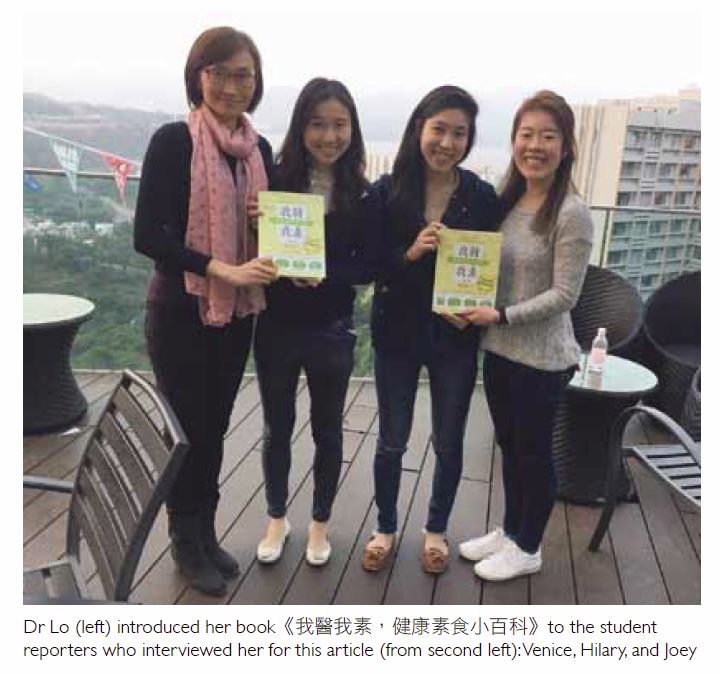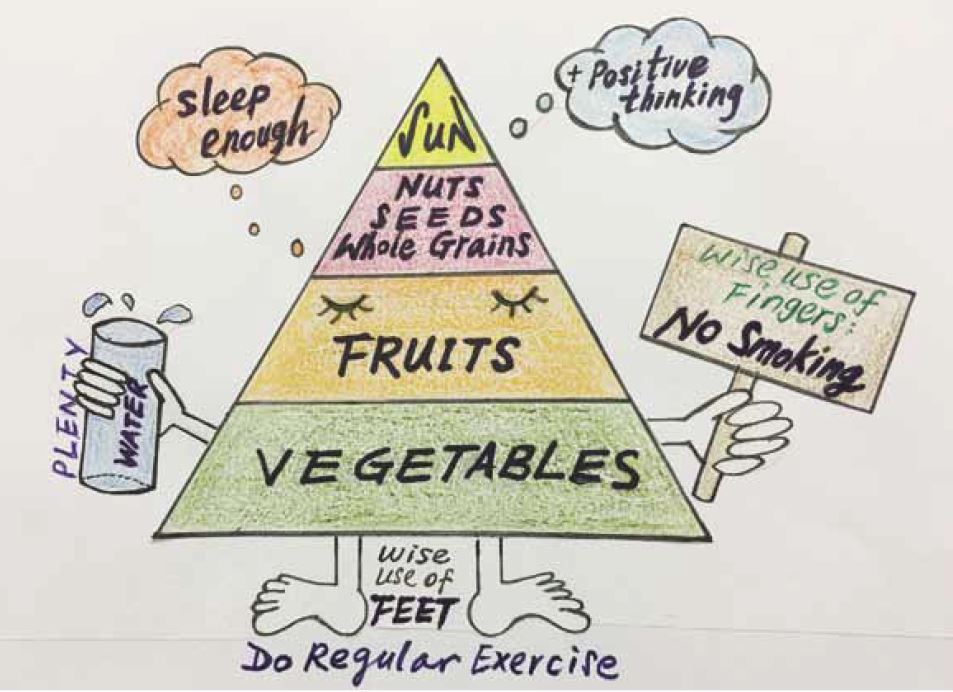© Hong Kong Academy of Medicine. CC BY-NC-ND 4.0
DOCTOR FOR SOCIETY
The secret to disease-free living: a wholefood
plant-based diet. An interview with Dr Irene Lo
Joey HY Chan, Hilary HC Kwok, Venice SW Li
Year 5 (MB ChB), The Chinese University of Hong
Kong
Dr Irene Lai-oi Lo has been a vegan for 20 years.
Her life as a hepatobiliary surgeon at Queen Elizabeth Hospital is fuelled
by uncooked greens and cruelty-free wholefood. She embodies the discipline
and compassion of a plant-based philosophy, and a year ago she published
her first book 《我醫我素,健康素食小百科》. She strives to share her choice of
lifestyle with her patients, and she is encouraging the wider audience in
Hong Kong to do the same.
Search for a healthy, cruelty-free diet
When Dr Lo graduated from medical school 20 years
ago, she had the opportunity to visit a farm where she witnessed the
butchering of animals. Appalled by the cruelty and suffering of the
animals, she determined to stop eating meat. Like many others, she says
she had numerous questions: “Will I have enough nutrients? Will a
plant-based diet make me fall sick more easily? Will I die?” These doubts
and uncertainties, together with a lack of awareness of plant-based eating
in Hong Kong became her motivation to search for a healthy diet.
After thorough research, she realised that meat is
not as healthy as society believes. An “undesirable package” of
antibiotics, tranquilisers, hormones, and other chemicals, all of which
can be harmful to humans, is released or added artificially in the rearing
and processing of animals. In addition, the processing of refined
carbohydrates such as white sugar, bread, pasta, and noodles and the
high-temperature cooking of other foods destroy certain vitamins and
nutrients necessary for healthy living. Insufficient dietary intake of
these nutrients can lead to a weaker immune system and increase the risk
of cancers and other metabolic diseases. Research has shown that a
plant-based diet that emphasises specifically healthy plant foods is
associated with a substantially lower risk of type 2 diabetes than a diet
rich in less healthy plants and animal foods.1
2 Adequate sunlight exposure,
sufficient water intake, regular exercise, and a cigarette-free lifestyle
are also key to healthy living. Dr Lo thus opted for a wholefood
plant-based diet.
Wholefood plant-based diet and its benefits
A wholefood plant-based diet comprises three key
components: plant-based food, wholefood, and raw food. It is based on raw
unrefined plants, whole grains (such as brown rice, red rice, quinoa, and
millet) and fruits, and excludes meat, dairy products, eggs, and
highly-refined or processed food.
After switching to a wholefood plant-based diet, Dr
Lo noticed incremental changes in her life: “I haven’t been sick for the
past 10 years. Not even a sore throat!” explained Dr Lo. “My skin became
better and wounds healed faster. There were no more menstrual cramps or
menorrhagia, and the pimples on my face and back were gone. My breast
fibroadenosis even resolved without treatment.”
Community engagement
After her positive experience with the wholefood
plant-based diet, Dr Lo decided she needed to share this information with
others. She began by writing information leaflets for her patients. She
would note down advice about changes they could make in their diet to
hasten recovery, reduce recurrence of their disease, and to generally lead
a healthier life. For example, as a hepatobiliary surgeon, she saw
numerous patients undergoing Whipple operation, hepatectomy, and many
other types of gastrointestinal tract surgery. Postoperatively she would
recommend patients to consider a change to a wholefood plant-based diet,
with a focus on achieving “digestive efficiency”. These leaflets were very
well received by her patients, who often returned to her clinic excited
see her and share their positive experiences with the dietary changes.
Gradually she broadened her advice to cover other health issues such as
dyslipidaemia, hypertension, diabetes, gastrointestinal disease, and many
others.
With all this positive feedback, she realised she
was onto something, and that she needed to disseminate this information
more widely, beyond the realm of the patients she encountered during her
job as a surgeon. She decided to put all these notes that she had been
writing for her patients together into a book. In addition, she has given
numerous talks, and given countless interviews for newspapers, magazines,
radio and television. Her goal is to share this idea of the wholefood
plant-based diet with as many people as possible, so that they understand
the potential benefits and have the knowledge to make informed choices
about what they eat.
Reflections
Embarking on the road less travelled is never easy.
Dr Lo has occasionally doubted her passion and wondered if it is a waste
of time. Despite this, her positive thinking and determination, together
with positive feedback from her patients and readers motivate her to keep
going.
Dr Lo hopes to promote lifestyle medicine in
academia as well, and to inspire other people to take up the challenge and
enjoy the benefits of a wholefood plant-based diet. “I am confident and
happy to share the message that human beings can live a radiant life
without animal-based food. And it is all evidence-based!”
References
1. Sluijs I, Beulens JW, van der A DL, et
al. Dietary intake of total, animal, and vegetable protein and risk of
type 2 diabetes in the European Prospective Investigation into Cancer and
Nutrition (EPIC)-NL study. Diabetes Care 2010;33:43-8. Crossref
2. Satija A, Bhupathiraju SN, Rimm EB, et
al. Plant-based dietary patterns and incidence of type 2 diabetes in US
men and women: Results from three prospective cohort studies. PLoS Med
2016;13:e1002039. Crossref

Figure 2. Dr Lo (left) introduced her book《我醫我素,健康素食小百科》to the student reporters who interviewed her for this article (from second left): Venice, Hilary, and Joey


